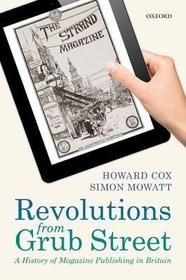
Revolutions from Grub Street
A History of Magazine Publishing in Britain
-
10% KEDVEZMÉNY?
- A kedvezmény csak az 'Értesítés a kedvenc témákról' hírlevelünk címzettjeinek rendeléseire érvényes.
- Kiadói listaár GBP 32.99
-
15 760 Ft (15 010 Ft + 5% áfa)
Az ár azért becsült, mert a rendelés pillanatában nem lehet pontosan tudni, hogy a beérkezéskor milyen lesz a forint árfolyama az adott termék eredeti devizájához képest. Ha a forint romlana, kissé többet, ha javulna, kissé kevesebbet kell majd fizetnie.
- Kedvezmény(ek) 10% (cc. 1 576 Ft off)
- Kedvezményes ár 14 184 Ft (13 509 Ft + 5% áfa)
Iratkozzon fel most és részesüljön kedvezőbb árainkból!
Feliratkozom
15 760 Ft

Beszerezhetőség
Megrendelésre a kiadó utánnyomja a könyvet. Rendelhető, de a szokásosnál kicsit lassabban érkezik meg.
Why don't you give exact delivery time?
A beszerzés időigényét az eddigi tapasztalatokra alapozva adjuk meg. Azért becsült, mert a terméket külföldről hozzuk be, így a kiadó kiszolgálásának pillanatnyi gyorsaságától is függ. A megadottnál gyorsabb és lassabb szállítás is elképzelhető, de mindent megteszünk, hogy Ön a lehető leghamarabb jusson hozzá a termékhez.
A termék adatai:
- Kiadó OUP Oxford
- Megjelenés dátuma 2015. szeptember 17.
- ISBN 9780198755456
- Kötéstípus Puhakötés
- Terjedelem276 oldal
- Méret 236x157x15 mm
- Súly 456 g
- Nyelv angol 0
Kategóriák
Rövid leírás:
Based on extensive new research, the book provides a unique overview of one of Britain's most successful creative industries, consumer magazines, from its seventeenth-century origins into the digital age. It charts the revolutions that took place in both technology and industrial organization, and the response to these changes.
TöbbHosszú leírás:
Revolutions from Grub Street charts the evolution of Britain's popular magazine industry from its seventeenth century origins through to the modern digital age. Following the reforms engendered by the Glorious Revolution of 1688 the Grub Street area of London, which later transmuted into the cluster of venerable publishing houses centred on Fleet Street, spawned a vibrant culture of commercial writers and small-scale printing houses. Exploiting the commercial potential offered by improvements to the system of letterpress printing, and allied to a growing demand for popular forms of reading matter, during the course of the eighteenth century one of Britain's pioneering cultural industries began to take meaningful shape. Publishers of penny weeklies and sixpenny monthlies sought to capitalise on the opportunities that magazines, combining lively text with appealing illustrations, offered for the turning of a profit. The technological revolutions of the nineteenth century facilitated the emergence of a host of small and medium-sized printer-publishers whose magazine titles found a willing and growing audience ranging from Britain's semi-literate working classes through to its fashion-conscious ladies.
In 1881, the launch of George Newnes' highly innovative Tit-Bits magazine created a publishing sensation, ushering in the era of the modern, million-selling popular weekly. Newnes and his early collaborators Arthur Pearson and Alfred Harmsworth, went on to create a group of competing business enterprises that, during the twentieth century, emerged as colossal publishing houses employing thousands of mainly trade union-regulated workers. In the early 1960s these firms, together with Odhams Press, merged to create the basis of the modern magazine giant IPC. Practically a monopoly producer until the 1980s, IPC was convulsed thereafter by the dual revolutions of globalization and digitization, finding its magazines under commercial attack from all directions. Challenged first by EMAP, Natmags, and Condé Nast, by the 1990s IPC faced competition both from expanding European rivals, such as H. Bauer, and a variety of newly-formed agile domestic competitors who were able to successfully exploit the opportunities presented by desktop publishing and the world wide web.
In a narrative spanning over 300 years, Revolutions from Grub Street draws together a wide range of new and existing sources to provide the first comprehensive business history of magazine-making in Britain.
The authors combine their extensive research into business archives with an impressive knowledge of company reports, trade journals, and the fragmented academic literature to produce a history full of facts, figures, and rich detail. This volume will surely be a much-consulted reference work for scholars in the area for years to come the first proper history of the UKs magazine sector. Anyone interested in the history of publishing, print culture, or the media will find much of value here.
Tartalomjegyzék:
Introduction
A Small but Expanding Market
Feeding the Popular Demand
From Mass Periodicals to Mass Production
The Dominant Female
Monopoly, Power, and Politics
The Ministry of Magazines
Breaking into the IPC Citadel
The Global Magazine in the Digital Age




